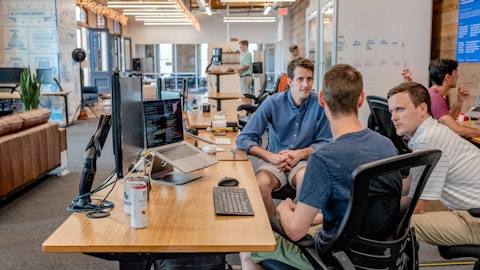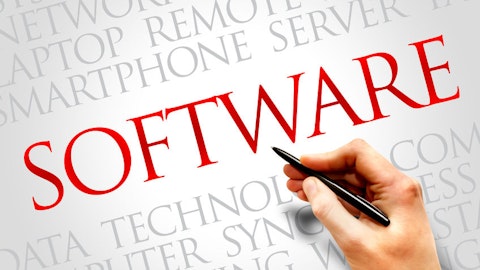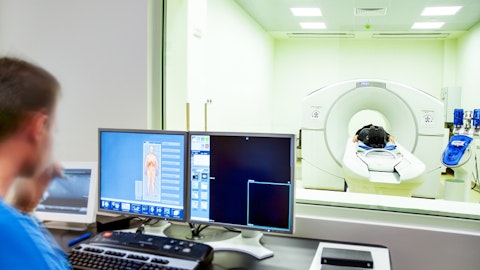Matthew VanVliet: Very helpful. And, Dave, your comments seem to sort of imply that the majority of headcount additions for the full year have more or less been made here. So, one, wanted to just sort of confirm that’s what your comments implied. But maybe more importantly, what would give you the confidence or the rationale to add additional headcount in the back half, especially as we think about the continued success of new business wins? Do you need some additional capacity potentially on the services delivery team, especially as the Marriott project ramps up, or where do you stand in terms of total capacity on the delivery team in light of the better bookings performance of late?
Dave Wood: Yeah, so starting with the services team, I mean, we still have ramp left on the services team. I mean, they’ve done a tremendous job with revenue through the first half of the year, but there’s still ramp left on that team, which their gross margin should continue to increase. But, certainly I think we’re pretty settled and we’re pretty from a headcount, whether it’s OpEx or delivery, we’re pretty settled on headcount and, certainly for the revenue guidance we’ve given. But that’s not to say that we wouldn’t make more incremental investments as we see fit. Right? If other parts of the market start to open up or there’s something, we wouldn’t be foolish over that. But we feel pretty settled on where we sit from a headcount perspective at the moment.
Matthew VanVliet: All right, great. Thank you.
Operator: Thank you. One moment for our next question. And our next question comes from the line of George Sutton from Craig-Hallum. Your line is open.
George Sutton: Thank you. Ramesh, I appreciate the fishing analogy in particular. So you and I have talked about increasingly you are playing offense versus playing defense, particularly when you’re out at a large trade show. I just wondered if you could walk through what exactly you mean by that and help translate that to part of why you’re seeing the sales success and the increased guidance.
Ramesh Srinivasan: Yeah. So that comment about offense versus defense, like, when you compare us to a few years ago, right, during my initial days here, and even a couple of years after we got here as we started improving the products, whenever you meet customers in trade shows, the success of implementations tends to be measured by the low number of pending issues, pending technical issues. Oh, there are only 10 issues pending to be resolved. That’s how they tend to be measured, and you’re constantly playing defense with customers, making sure they stay with you despite the technical issues that are there and all that. In recent shows, especially this year, in the various shows we have attended, there were more and more stories, and some of these stories were shared publicly in publicly attended sessions, where they were talking about, we moved from a competing system to Agilysys, we implemented their core PMS product and these two or three additional modules, and these business parameters went up from this percentage to that.
So they were actually happy to share those details with other customers, so that’s what I mean by playing offense, that we no longer go into trade shows expecting to play defense like many enterprise software companies do, where customers are going to come and complain and you’re going to defend with them. Now we are looking for the positive stories that can be shared with other customers. So more and more we are switching to offense from the defense we used to be many years ago and the products are supporting that and our implementation services staff are supporting that. Our support is becoming better as we go along. So there are more positive stories for customers to share with others that provide an incentive for other customers to buy the products as well.
That’s what I meant, George.
George Sutton: That’s great. So there were clearly some big large operators, particularly in the gaming space, that have had some cybersecurity issues. I know you’ve made a big investment in your capabilities on the cybersecurity side. Can you talk about any impacts that those have had to you and what happens when cybersecurity becomes part of a sales cycle, which I know is increasingly important? How are you doing in those situations?
Ramesh Srinivasan: Yeah, so a number of questions there. Let me make sure I cover all of them. Number one, no impact directly. There’s a couple of news that you have heard recently. No direct impact. Our knowledge of the incidents and our overall understanding of the incidents is nothing more than what has been reported publicly. So not impacted directly and we are not directly involved in it, though we were there to help the customers with bringing up the various products back up again, to the extent they asked us for help, of course, we were absolutely always there to help them. So a couple of things to keep in mind here, George, as you think through this. Number one, cybersecurity incidents are not new in hospitality. If you just go look up in the last, say, five years or so, there’s quite a list of hospitality customers, our customers, who have been affected by this, because they tend to deal with a lot of guests, lot of consumers, so hospitality tends to be like a magnet, right, it attracts the hackers and cybersecurity incidents tend to happen.
So number one, what happened a few months ago is not new. It has happened many times before, so that is one thing to keep in mind. The other thing to keep in mind is our revenue growth now is broad-based. Our sales and revenue growth — sales growth, revenue growth is broad-based and not too dependent on one, two, or three customers, right? Right across the chain, only in enterprise software, so we are not in the SMB space, but in that enterprise software, the size doesn’t matter, there’s just a lot of fish in the pond, to use that analogy. Some decisions do get postponed, George, but none of them get canceled, and those kinds of decisions being postponed because they are focused on getting themselves back or tightening cybersecurity around themselves does not too badly affect our sales or anything.
The patients get postponed and then they tend to happen a few months later. So it’s not any direct impact or something we are too worried about from a sales or revenue growth standpoint. But what we are worried about is making sure we are there to help the customers whenever required and we do help several customers during the year. This is sort of a regular thing, and reasonably frequenting, and we are always there to help customers, we have security specialists with us, and all that. So we are always involved in helping, but I wouldn’t be worried about these from a sales and revenue growth standpoint. So we have protected ourselves very well as best as we can. There is no perfection in cybersecurity, multiple layers within the company, very severe training of employees, very stringent training of employees, protecting various layers of our business.
And even if a hacker gets through to one layer, making sure they cannot reach much else. So we have worked with several great vendor partners to do increasing investments to make sure that we are absolutely about as well protected as you can be. And also in application design, in the applications we create, information security personnel are always involved. Now it’s a joint exercise among IT, information security, and product development to make sure that the products we are creating cannot be used as a weapon later on. Again, there’s no perfection there, but we are absolutely doing our best to both protect ourselves and the customers.
George Sutton: Apologies, I’d love to just squeeze one more in. You haven’t said a favorable thing necessarily about managed food service for a while, and this sounds like it was a pretty good quarter. Could you just give us a little bit more specificity in that specific area?
Ramesh Srinivasan: Yeah, so the FSM business, George, continues to recover and progress well from COVID time. But if there is a star in this particular first half of sales and Q2 sales, it is definitely resorts and cruise ships. So what we refer to as HRC internally, hotels, resorts, cruise ships, was definitely the star performer compared to how much things have improved over the last couple of years. FSM, I would say, continues to show a steady improvement from the depth of the COVID days.




